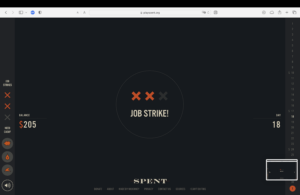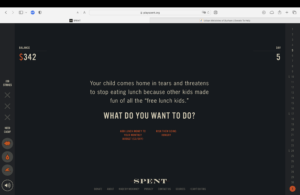[Edit: Re-classified as CS377G]
Title: SPENT, by McKinney Ventures
What is it about: It’s a simple text-based game about homelessness in America.

What kind(s) of play it uses:
In SPENT, the goal for players is simple: to live (or rather: survive) for a month as a person on the cusp of homelessness in America. There aren’t any other rules: the only rule of the game seems to be that the whole world is out to get you, with bad news followed by worse news.

And even on days where nothing bad happens, every otherwise normal life event feels like a catastrophic event. Therefore: no rules other than constant worrying. Since the gamespace is limited (SPENT comes in the form of an interactive story set in an anonymous location, somewhere in the American heartland), player actions are equally simple: choose between two and four options whenever you’re faced with a new problem. No objects needed or available. Just miserable choices.
I don’t know who’s the intended target audience. The game feels perfect for a social media campaign. Its modern design and hot-button issue means I’d probably click on it. Or to be included in a mailing. But no matter who the player ends up being, the game doesn’t depend much on them. Unlike what was described in Games, Design, & Play, creating this doesn’t appear to have been much of a “second-order design problem.” The Twine-like storytelling gives the designers deep control over my experience; it was similar each time I played.
While it’s difficult to know the player and why they’re playing, it’s easy to know how they’ll feel. They’ll feel the inescapable grip of poverty, how there’s no good choices to make. I, for myself, tried to cut any expense not strictly necessary (no weddings out of state, no babysitter so I can see friends). That didn’t save enough money to be prepared when I needed a root canal. Ignoring that would have only lead to greater problems in the future, but that expense meant I couldn’t keep my car.
I managed to make it till the end of the month, but only by *not* giving my kid money to go the museum with its schoolmates, and skipping my kids’ play at school so I could make $50 helping my neighbor move. The only thing I couldn’t say no to is my kid going to a special program for gifted kids – but applying to the scholarship needed for it meant I had to miss a workday.
I’ve detailed all this to highlight what this game does so well. Playing felt claustrophobic, like I couldn’t escape. It makes players feel the pain of people living in similar circumstances. One of the most effective ways was through a system of three strikes when missing work (see screenshot #1). That’s incredibly effective since we can relate to being scared of losing our job. Even more effective was the use of a child: it feels so unfair that someone is bullied for being poor or already may have their intellectual wings cut so early in life, through no fault of their own (screenshots #2 and #3). The added factual explainers strengthen the emotional toll (screenshot #4).




How does the MDAO framework apply:
The game is driven by its interactive storytelling Mechanics, which inform how the game unfolds. Looking at Aesthetics, the key emotions the game tries to invoke other than compassion and sadness, is a sense of challenge and discovery – just not positive discovery.
This is translated into Dynamics in multiple ways: the 30-day stretch to survive, alongside the running tally of money in the bank and bills that need attention, highlight the challenge. And the fact we don’t know what we’re getting into, there not being a map of the game and upcoming choices promotes a sense of unpleasant discovery. Around every corner we discover bad news.
The Dynamics support the Aesthetics incredibly well, and the Mechanics chosen are appropriate for the serious game and the emotional reaction it wants to elicit. The game feels balanced, even though I’m sure the choice for a text-based game was informed at least partly by a wish to keep cost low – I doubt a charity has the deep pockets needed to create a more complex 3D game.
Maybe the charity did after this campaign though? Already after playing the game for the first time, I was so worked up and felt an intense urge to donate. But, on the payment page, I abandoned the cart remembering I’d already spent my entire donation budget for the month, with this game a painful reminder not to overspend. It was too well-executed to make me part with my money.

